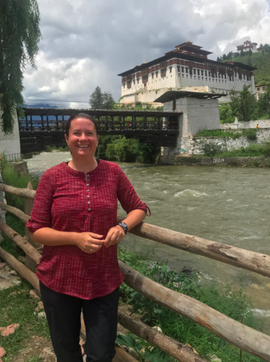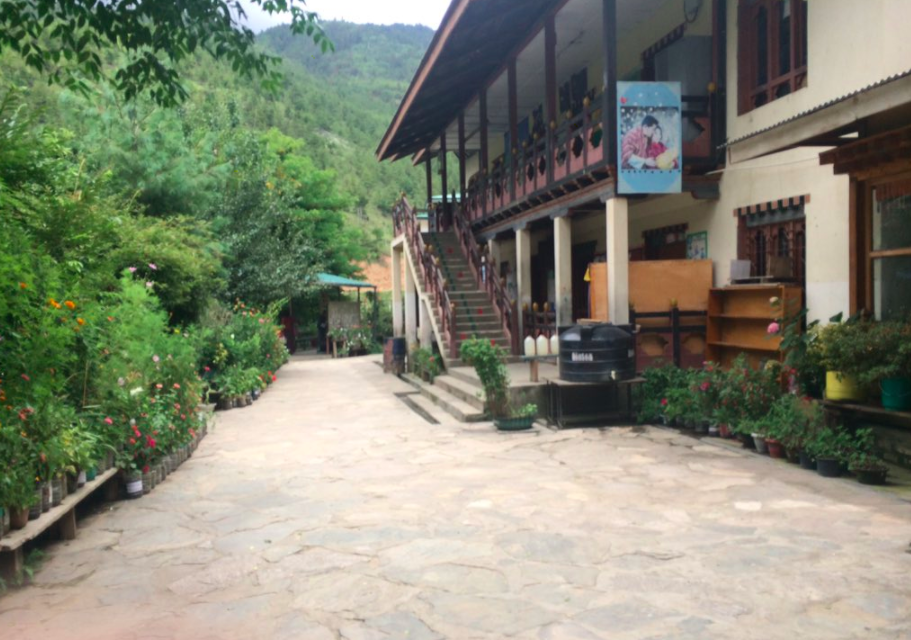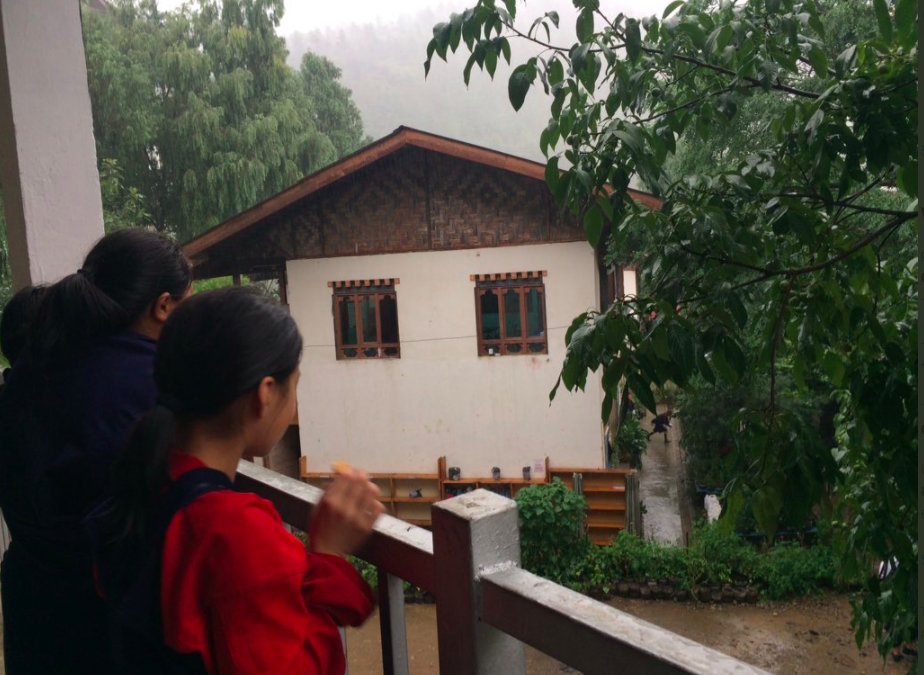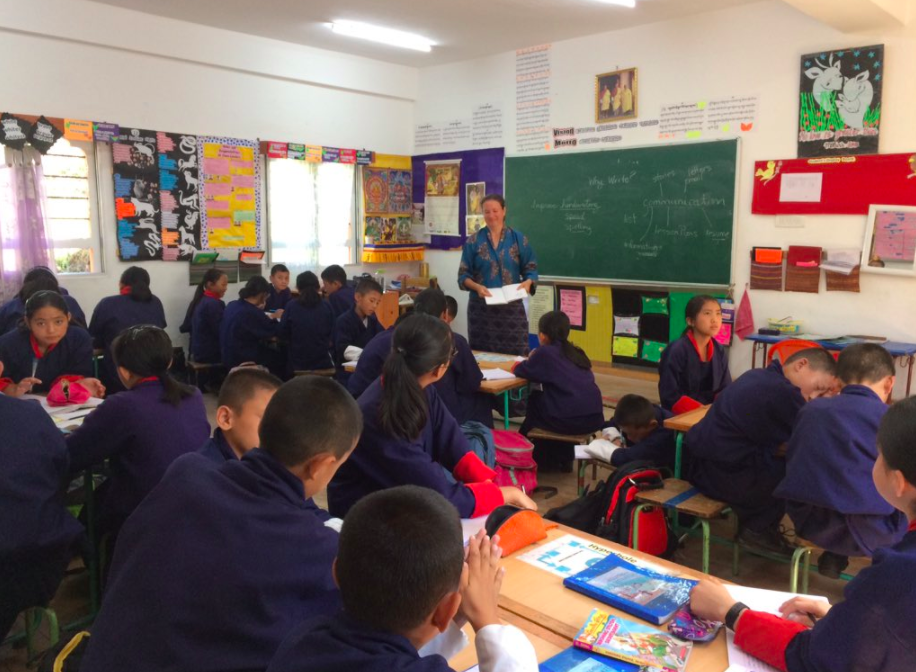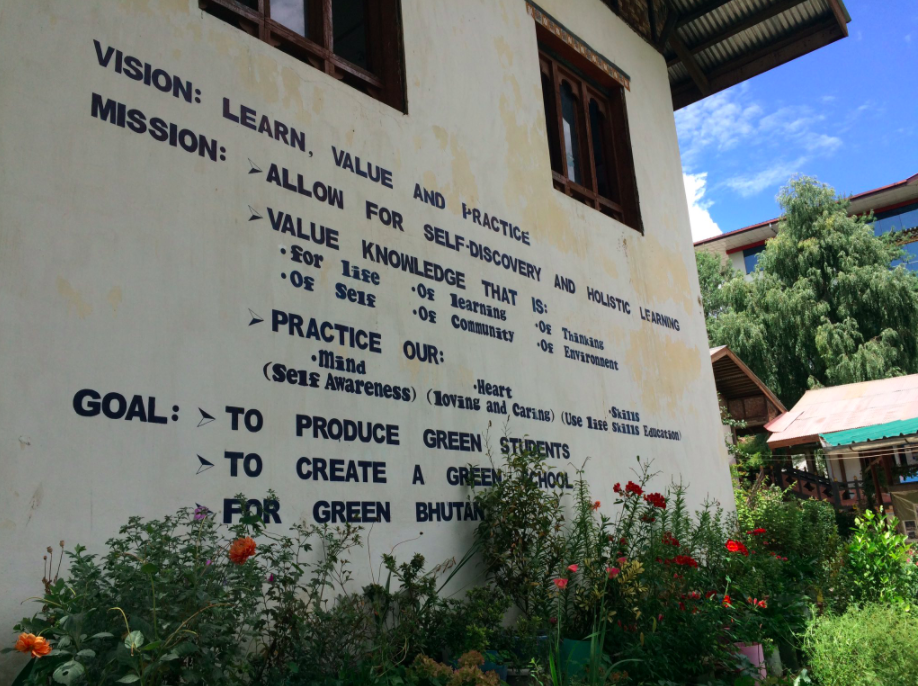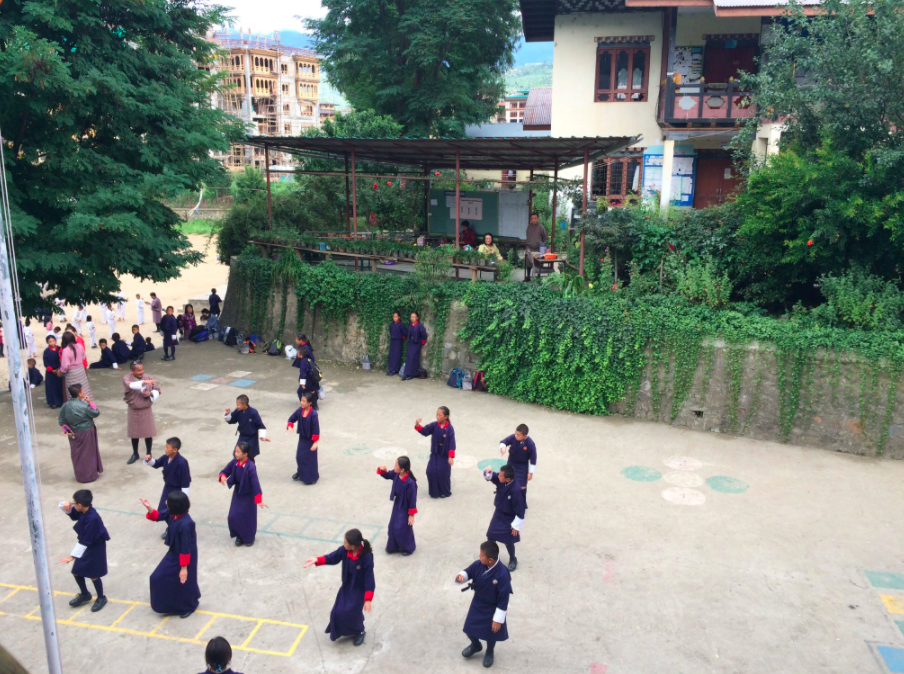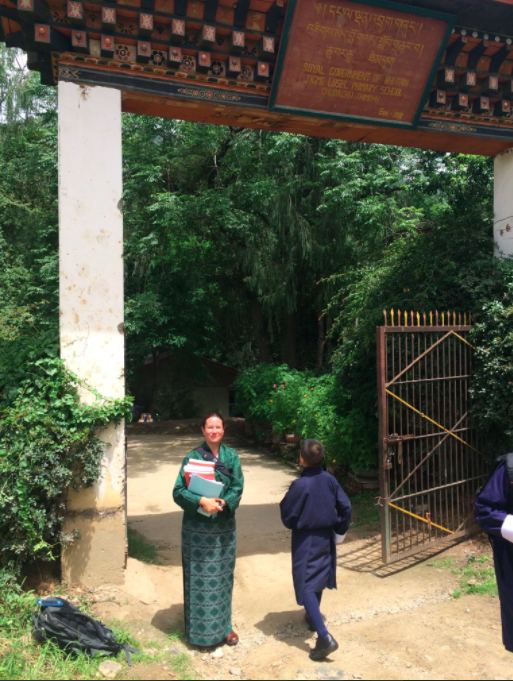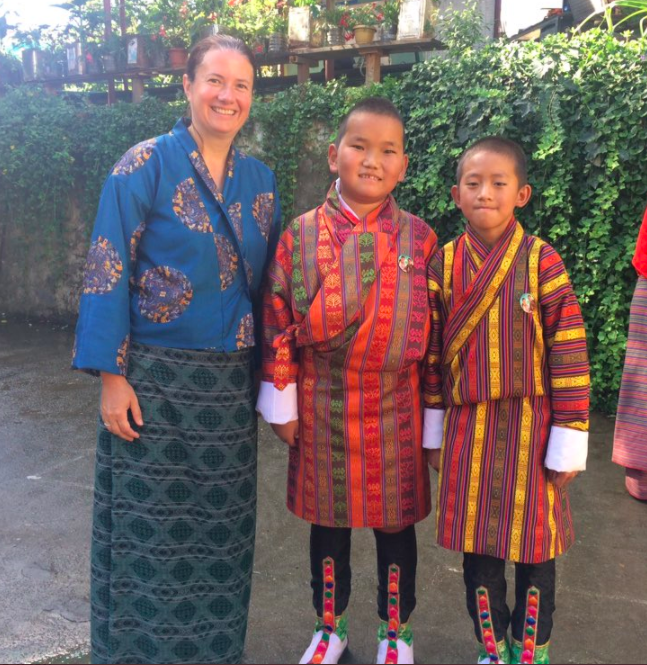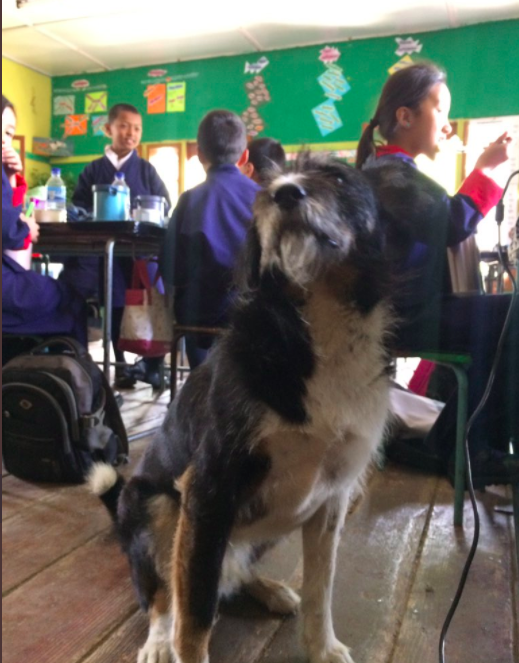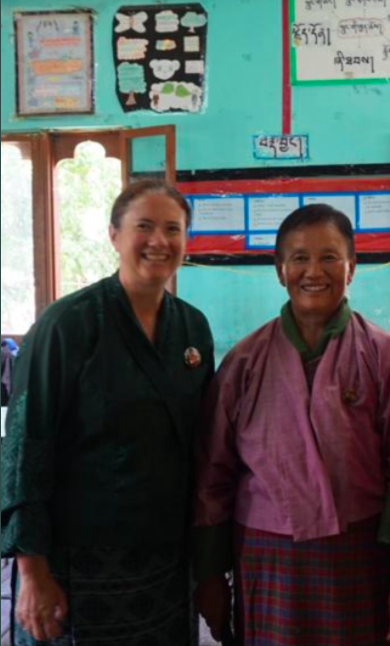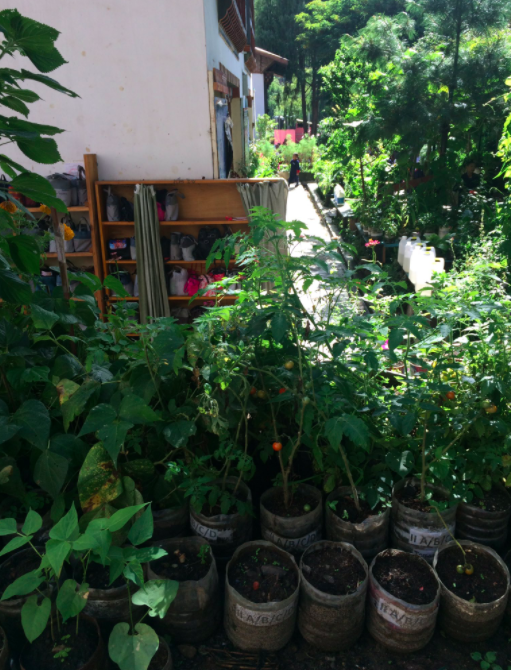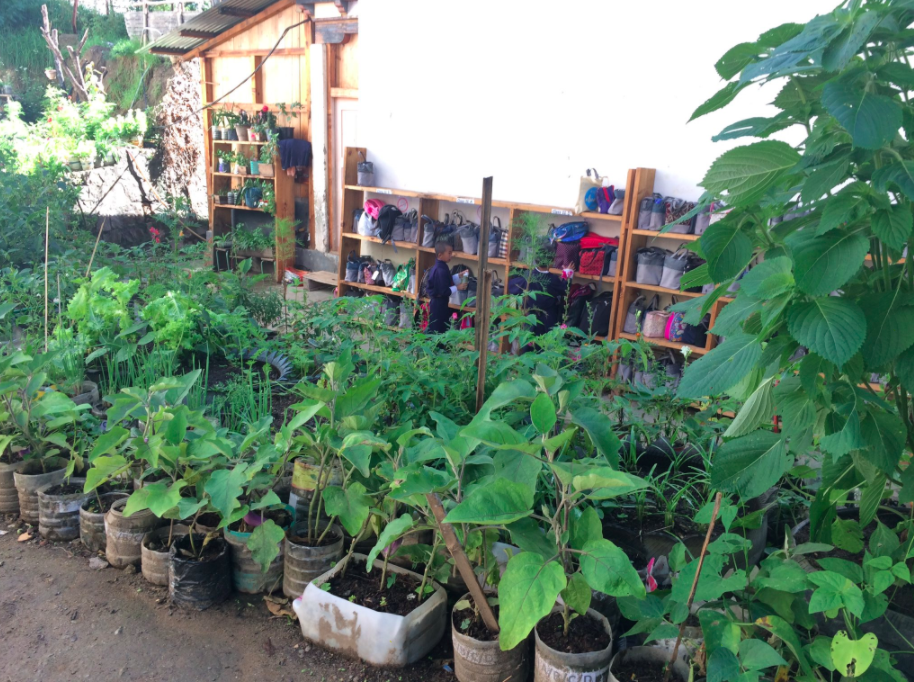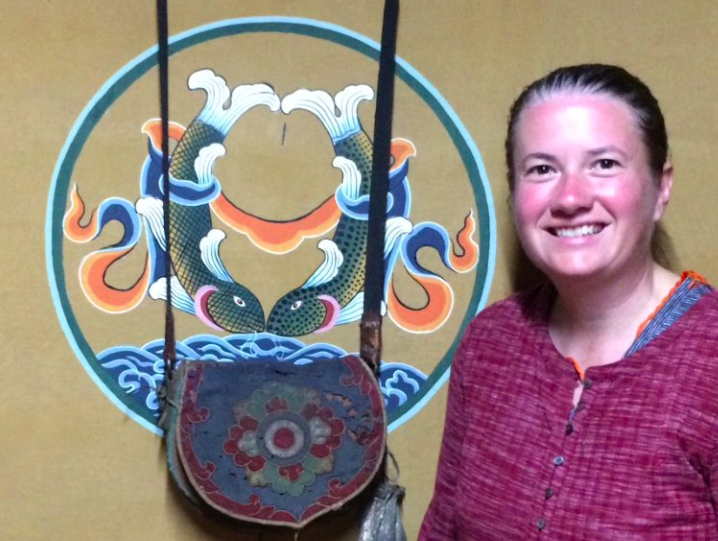Getting the opportunity to teach in a different country is such a gift of learning! I was so privileged to have had the opportunity to work and learn alongside students from Jigme Losel primary school in Bhutan. This school is recognized as a Green School that runs many transformative programs and initiatives in a country recognized for its work to create happiness for all its citizens.
Information in opportunities and ways you too can learn from international experiences are shared at the bottom of the page...
Information in opportunities and ways you too can learn from international experiences are shared at the bottom of the page...
The school I worked at in Bhutan is a green school. They grow vegetables that are used to cook lunches for students and to teach responsibility to care for plants. The constitution of Bhutan says over 60% if the country has to stay forested. A very green country!
I learned so much at Jigme Losel primary school in Bhutan.
I learned so much at Jigme Losel primary school in Bhutan.
Connections Through Fish Adventures (published in Connections Outdoor Journal 2020)
As I climbed the last few kilometers through the cypress forest toward the Dzong (a Bhutanese fortress and monastery), I could not help but think that this was all connected to my Grade 5 students—and to fish. Here I was on the other side of the world doing the same thing I ask of all my students; I was learning new things and discovering new people and possibilities.
I’m really not someone who has been particularly interested in fish. I had gone fishing a few times in my childhood, where I had the sneaking suspicion that the only nonedible fish in the river (a sunfish) was
constantly rebiting my hook. That is as far as fish and I ever went.
So when the FinS (fish in schools) program at the Bow Habitat sent out an invitation to raise and then release trout, I had mixed feelings. I must admit that I was more invested in getting my students out to the mountains to release the fish than the actual raising of them, but it seemed an excellent opportunity to provide hands-on learning in the classroom, so soon the fish arrived. That year we raised the baby trout from eggs to fingerlings and connected a whole year of inquiry into water conservation. Actually, the students did the raising! I was more of a go-between, sending panicked e-mails to the lovely (and very patient!) education coordinators, when our fish tank’s pH was off or a baby fish seemed sick. As one of the students summarized “being a fish mom can be stressful! You can lose them easily as they are so small and there are so many of them!” That year culminated with a design challenge where students built an interactive display that taught others about water issues. The students became experts on topics like the impacts of waterways in Canadian exploration, influences of invasive species and, of course, how to raise and release trout. The next year, my class was selected to participate in an Explorer Exchange through National Geographic. This opportunity connects educators with National Geographic explorers for a full year of collaboration. With a Grade 5 group consisting of mostly active boys, I was a bit nervous about how it would go. How well were they going to engage in virtual conversations? Fortunately, the class was matched with the perfect person—a television star who could engage and enthrall my class! Zeb Hogan (star of the television series Monster Fish) studies (you guessed it!) the largest freshwater fish around the world! We talked to Zeb throughout the year in virtual format. We learned how he does research, conducts the scientific process and shares his research. We also discovered how to ask quality questions. Zeb Hogan not only had the students connected and engaged with conservation; he also had me starting to see the importance of those big fish species! So this summer when an opportunity came up to volunteer as a teacher in Bhutan, I was really excited! Bhutan is best known for its philosophy of Gross National Happiness, but their conservation efforts are also amazing! Bhutan preserves for all time (written into their Constitution) 60 per cent of its land under forest cover!
(See www.worldwildlife.org/projects/bhutan-committed-to-conservation.)
I was curious about their education and the values that youth received in their schools. They obviously appreciated fish, as Zeb Hogan shared that the endangered giant golden mahseer is thriving in Bhutan.
(See www.nationalgeographic.com/animals/2019/07/golden-mahseer-conservation-bhutan/.)
I spent my summer in the capital of Bhutan (Thimphu), teaching at Jigme Losel, a school that is recognized as a green school.Green because it has an amazing garden stretching throughout the grounds, along with an effective recycling program and efforts to use less waste. While teaching the (Grades 4–6 aged) students, I asked them what they thought of fish—telling them of how my fish experiences had helped bring me to them. They shared stories of the eight auspicious symbols recognized in Bhutan that are good luck—and how one of them is a fish. They also pointed to a mountain across the valley and shared that if I hiked to its top, I would find giant fish at the Dzong.
So that weekend I went. I climbed to the top of the hill overlooking Thimphu and came to the Dzong perched above the valley.
The ancient building with its dark- orange coloured clay walls had a quiet feel that resonated with old stories. I wandered around the building, greeting local people who had also hiked up for the day. I did not see a pond or river anywhere. I finally came to rest on a rock overlooking the valley. Despite the lack of fish, I reflected on my adventures and discoveries and felt excited to share them back with my Bhutanese and Canadian students. I felt very lucky and connected to the world!
Fortune smiled on me, and I struck up a conversation with a local family. My quest for the elusive fish soon came out, and they laughed happily and pointed to a small building. “The fish is in there,” they explained, and it was! The resonant sound of monks chanting and the smell of incense met me at the door. As I entered and my eyes adjusted to the dim light, I saw—there in the corner in a glass case—a dried fish larger than
me! A monk approached me and told me the story of the fish, the river and the history of Thimphu. It was a story that involved a deep appreciation for the environment.
Now I am back in Canada, and the students I am teaching are excited to write to the Bhutanese students I had told them about. They are sharing their stories of what they value and appreciate. While reflecting on mysteries found on far-off hills and classrooms, I think about how I never thought I would think so fondly of fish! Fish have taught me about my students. They have shown me how my students can care about the tiniest of baby trout, take up complex topics, research like an expert, and if you listen to them closely, they share ideas and
questions that lead to amazing discoveries. Naturally, this year, many of the stories the students are writing to their friends in Bhutan include adventures with our classroom fish tank (donated through the Calgary Aquarium Society). I’m sure it is the beginning of some great learning for us all!
For more information:
Bow Habitat Station Fish in Schools
http://bowhabitat.alberta.ca/programs/fish-in-schools.aspx
National Geographic Connect with an Explorer
www.nationalgeographic.org/education/explorer-connections/
Calgary Aquarium Society
www.calgaryaquariumsociety.com/
Bhutan Canada Foundation
https://bhutancanada.org/resourcehub/
Please see The Bhutan Foundation of Canada for more information about their program.
As I climbed the last few kilometers through the cypress forest toward the Dzong (a Bhutanese fortress and monastery), I could not help but think that this was all connected to my Grade 5 students—and to fish. Here I was on the other side of the world doing the same thing I ask of all my students; I was learning new things and discovering new people and possibilities.
I’m really not someone who has been particularly interested in fish. I had gone fishing a few times in my childhood, where I had the sneaking suspicion that the only nonedible fish in the river (a sunfish) was
constantly rebiting my hook. That is as far as fish and I ever went.
So when the FinS (fish in schools) program at the Bow Habitat sent out an invitation to raise and then release trout, I had mixed feelings. I must admit that I was more invested in getting my students out to the mountains to release the fish than the actual raising of them, but it seemed an excellent opportunity to provide hands-on learning in the classroom, so soon the fish arrived. That year we raised the baby trout from eggs to fingerlings and connected a whole year of inquiry into water conservation. Actually, the students did the raising! I was more of a go-between, sending panicked e-mails to the lovely (and very patient!) education coordinators, when our fish tank’s pH was off or a baby fish seemed sick. As one of the students summarized “being a fish mom can be stressful! You can lose them easily as they are so small and there are so many of them!” That year culminated with a design challenge where students built an interactive display that taught others about water issues. The students became experts on topics like the impacts of waterways in Canadian exploration, influences of invasive species and, of course, how to raise and release trout. The next year, my class was selected to participate in an Explorer Exchange through National Geographic. This opportunity connects educators with National Geographic explorers for a full year of collaboration. With a Grade 5 group consisting of mostly active boys, I was a bit nervous about how it would go. How well were they going to engage in virtual conversations? Fortunately, the class was matched with the perfect person—a television star who could engage and enthrall my class! Zeb Hogan (star of the television series Monster Fish) studies (you guessed it!) the largest freshwater fish around the world! We talked to Zeb throughout the year in virtual format. We learned how he does research, conducts the scientific process and shares his research. We also discovered how to ask quality questions. Zeb Hogan not only had the students connected and engaged with conservation; he also had me starting to see the importance of those big fish species! So this summer when an opportunity came up to volunteer as a teacher in Bhutan, I was really excited! Bhutan is best known for its philosophy of Gross National Happiness, but their conservation efforts are also amazing! Bhutan preserves for all time (written into their Constitution) 60 per cent of its land under forest cover!
(See www.worldwildlife.org/projects/bhutan-committed-to-conservation.)
I was curious about their education and the values that youth received in their schools. They obviously appreciated fish, as Zeb Hogan shared that the endangered giant golden mahseer is thriving in Bhutan.
(See www.nationalgeographic.com/animals/2019/07/golden-mahseer-conservation-bhutan/.)
I spent my summer in the capital of Bhutan (Thimphu), teaching at Jigme Losel, a school that is recognized as a green school.Green because it has an amazing garden stretching throughout the grounds, along with an effective recycling program and efforts to use less waste. While teaching the (Grades 4–6 aged) students, I asked them what they thought of fish—telling them of how my fish experiences had helped bring me to them. They shared stories of the eight auspicious symbols recognized in Bhutan that are good luck—and how one of them is a fish. They also pointed to a mountain across the valley and shared that if I hiked to its top, I would find giant fish at the Dzong.
So that weekend I went. I climbed to the top of the hill overlooking Thimphu and came to the Dzong perched above the valley.
The ancient building with its dark- orange coloured clay walls had a quiet feel that resonated with old stories. I wandered around the building, greeting local people who had also hiked up for the day. I did not see a pond or river anywhere. I finally came to rest on a rock overlooking the valley. Despite the lack of fish, I reflected on my adventures and discoveries and felt excited to share them back with my Bhutanese and Canadian students. I felt very lucky and connected to the world!
Fortune smiled on me, and I struck up a conversation with a local family. My quest for the elusive fish soon came out, and they laughed happily and pointed to a small building. “The fish is in there,” they explained, and it was! The resonant sound of monks chanting and the smell of incense met me at the door. As I entered and my eyes adjusted to the dim light, I saw—there in the corner in a glass case—a dried fish larger than
me! A monk approached me and told me the story of the fish, the river and the history of Thimphu. It was a story that involved a deep appreciation for the environment.
Now I am back in Canada, and the students I am teaching are excited to write to the Bhutanese students I had told them about. They are sharing their stories of what they value and appreciate. While reflecting on mysteries found on far-off hills and classrooms, I think about how I never thought I would think so fondly of fish! Fish have taught me about my students. They have shown me how my students can care about the tiniest of baby trout, take up complex topics, research like an expert, and if you listen to them closely, they share ideas and
questions that lead to amazing discoveries. Naturally, this year, many of the stories the students are writing to their friends in Bhutan include adventures with our classroom fish tank (donated through the Calgary Aquarium Society). I’m sure it is the beginning of some great learning for us all!
For more information:
Bow Habitat Station Fish in Schools
http://bowhabitat.alberta.ca/programs/fish-in-schools.aspx
National Geographic Connect with an Explorer
www.nationalgeographic.org/education/explorer-connections/
Calgary Aquarium Society
www.calgaryaquariumsociety.com/
Bhutan Canada Foundation
https://bhutancanada.org/resourcehub/
Please see The Bhutan Foundation of Canada for more information about their program.
Over the summer, I was fortunate enough to be placed at Jigme Losal School in Thimphu. Upon meeting the principal Choki Dukpa, I was struck by how fortunate I was, to be able to work with such a knowledgeable and caring person. Choki Dukpa shared her vision of my time at her school as an opportunity to share my fluent English language and allow students to become more informed about and experience someone from another culture. Her hopes were that I would spend a little time at least with all the students (evidently valuing and deeply caring about all the students at her school). I taught language arts (specifically writing) to grade 6, 5 and 4 students. I tried to model lesson planning in instruction that is active, and hands-on. I also helped with reading instruction to a small group of students before school (and a teacher joined in who wanted to improve his English). I felt this group improved a great deal in this time and it was very effective. Furthermore, I jumped in and taught individual lessons to classes and teachers interested during my preps-including a PP class, gr 2, and several gr 4 social studies classes. It was great to teach with teachers who were interested in having me visit their classrooms and are so open! I appreciated when teachers asked if I would model and share specific teaching strategies. There is a great deal that I feel like I will bring back to my practice at home. I like how the school lived the approach of: to Learn, Value, Practice. The idea that through greater knowledge we are able to value something deeper, and through that value it becomes lived in how we go about our lives. I’ve already written the words ‘Learn, Value, Practice’ in my classroom. While walking around the school I saw happy- engaged students, who were always laughing and talking. They were curious of me and proud to share about their school grounds (particularly the recycling program and the vegetable and flowers). I loved the school gardens. I have always found that care for plants becomes a care for so much more (including ourselves and our space). I admire Bhutan’s commitment to the environment and keeping over 60% of its land to forest. I will continue to see the value in having students grow and care for plants - I just wish the amazing peppers and basil would grow in our colder climate back home! It was evident that the school values reading and is taking steps to create engaged readers. The school encourages students to come to school early and read on the school grounds. Each morning I walked around seeing the reading happening and was able to encourage students to choose books in the library that I knew they would enjoy and learn from. I encouraged all the teachers to read aloud every lesson to the students, as hearing books and stories is so valuable. I loved eating lunch with the students and exchanging information about our cultures! This was a great time for students to practice their English. I also feel that this experience was one of sharing knowledge. It was a professional exchange of ideas and information with the teachers as well. I ran a PD session for teachers about ‘effective strategies for engaging students”, but I also was able to have personal conversations with teachers about ways they are practicing teaching. We often found common idea and approaches; as well as, challenges teachers face. It was an opportunity to professionally exchange understanding that students are children, like all children. There are ones who, as teachers, you are deeply concerned about and wish there was so much more you can do for them. There are ones who are exasperating but you can’t help laughing with! Sometimes, I was able to give suggestions, “try moving them closer to the front”, “perhaps get their eyes checked”, but mostly I was a colleague who listened and encouraged because they were already doing such an outstanding job. When I think of teaching in Bhutan, I think that the chance to learn from others, and to share common understandings, is so valuable. To learn so that we can understand, and through understanding we are able to practice that understanding. Learn-Value-Practice. I hope that I shared some helpful resources and advice to teachers. That the students will remember some of my stories and how much I valued and admired their culture. I hope that the teachers continue to see the importance of reading aloud to the students that I emphases. I hope that I will continue to be helpful to teachers who I will stay in touch with via email. That we continue to share resources and support. We plan on exchanging stories writing with our classes, building meaningful purpose for writing stories and letters. Once again, thank you very much to everyone who made the Bhutan Canadian Reading Program possible. I truly feel that it was a valuable experience and that further partnerships with teachers will continue to contribute to teachers’ growth and student learning. Sincerely, Alison Katzko Footnote: I feel very blessed to have been able to spend time in Bhutan. It is a very special place. What I hope I have been able to hold onto is the value of connecting with people. People in Bhutan take time to value each other, to talk with each other. Food is shared happily and people really listen. One of my experiences of Bhutan is while I was flying back home I had to take 5 planes. I was carrying with me a rolled-up painting of the four friends that was given to me as a gift and wanted to hang in my classroom. I also had two Thangka Mandela paintings. The Mandela paintings I bought because my new friend (who was also placed in the same school as me by the Bhutan Canadian Foundation), had asserted that I bring something I truly appreciated home to remember Bhutan. She had insisted after seeing me look at so many! The roll of paper I carried with me from plane to plane, not wanting to lose the precious items. In an airport, tired and hungry, I set the roll down to buy a pizza slice. After I paid I went to pick the roll up and it was gone. I looked and looked. I asked everyone around, but everyone shrugged their shoulders. “Face it. It’s stolen” the unimpressed girl behind the counter declared. Feeling frustrated and assumed at myself for losing such a valued gift I sat in the waiting room for the next plane. An aunty sat down beside me. She had the round open face with deep brown eyes of someone from Bhutan. “Have you been to Bhutan she asked?” Feeling miserable I didn’t want to talk, but told myself I could not forget so quickly the friendly nature I had tried to practice being in Bhutan. I smiled and turned to her, her face bright with freckles. We chatted about where she was from in Bhutan and where she was going. She was a quilter, like my mom. I decided to confessed to her my loss of the roll of paintings, half thinking perhaps she would offer to mail me some if I sent her some money, or she would know a painter... I told her of how embarrassed I felt. She looked at me kindly and put her hand on my shoulder. There was not an emotional “oh that is terrible” or “it was not your fault” or even a “I can’t believe someone would do that!” She looked at me with such empathy and was just ‘with me’. She finally said, “You could choose to be upset...” I looked at her and thought. Then I completed, “...or I could choose to be happy that I know such amazing friends that would have given me such gifts in the first place. That I have had such amazing adventures and experienced and seen such beauty.” She did not smile like she was attached to any answer I gave, but she did look at me and say after a moment, “I like to think that is a sign you will return to Bhutan”. I don’t know if the answer I gave or the paintings going missing was ‘the sign’ she was talking about, because at that moment we were called to the board the plane. I think meeting her reminded me to always remember the greatest gift I have been given... to remember to choose happiness, to be mindful, and take time to talk and be empathetic to others.
That is a gift for Bhutan I will always hold close to my heart.
That is a gift for Bhutan I will always hold close to my heart.
PROFESSIONAL DEVELOPMENT OPPORTUNITIES FOR CANADIAN EDUCATORS:
Please note- dates and information changes so please contact the official website for exact information. The following are only suggestions and ideas:
Program: Outdoor play learning for educators.
Where: Evergreen Brick Works, Toronto, Ontario
Length of program: Workshops (varies -weekend,
Cost: The price per attendee is $130 (+HST) for individual workshops, or $360 (+HST) for all three workshops
Deadline:
Description: Professional development workshops for teachers and early childhood educators interested in outdoor learning and play for students.
More information: evergreen.ca/teachertraining
https://www.evergreen.ca/our-projects/professional-development-for-educators/
Program: Inside Education
Where: Alberta
Length of program: 3 to 5 days
Cost: Free
Deadline: Varies
Description: They give incredible teachers the means to venture far beyond their teaching objectives. They empower educators to inspire and engage young stewards by incorporating environmental and natural resource education into their classrooms".
More information: http://www.insideeducation.ca/teacher-professional-development/
Program: Historical Thinking
Where: Ottawa- Canadian Museum of History and Canadian War Museum
Length of program: July 15–19, 2019
Cost: $525 ($500 + GST) + accommodation and food.
Description: The Historical Thinking Summer Institute (HTSI) is designed for teachers, graduate students, curriculum developers, professional development leaders, historians and museum educators who want to enhance their understanding of historical thinking and their expertise in designing history programs, courses, units, lessons, projects, or educational resources that explicitly focus on historical thinking.
More information:
https://www.canadashistory.ca/education/historical-thinking-summer-institute?fbclid=IwAR3TnQnmAK4YZJB0kW1EatqkbKRgqm4PLuDNpvRg64MarTJ1EPySvhISM-E
Program: Space Matters - Space Educators Institute in August
Where: London, Ontario
Length of program: August 14-16
Cost: Registration costs $75.00 and includes access to all workshops, lunches, and swag. + 75$ for a single room in a shared suite.
A block of rooms are available for booking at the Ontario Hall.
Deadline: August 01, 2019.
Description:
More information:
Program: Students on Ice / Teachers on Ice
Where: Expeditions into the Arctic and Antarctic.
Length of program: July
Cost: Fees range but are about $15,000.
Description: Students on Ice (SOI) was established in 2000 with the mandate to educate the world’s youth about the importance of the Polar Regions, to support their continued growth and to inspire initiatives that contribute to global sustainability.
More information: https://studentsonice.com/about-us/
Program: Project Atmosphere and Project Maury - although these are US programs, through the Canadian Meteorological and Oceanographic Society, one Canadian candidate is chosen for each program.
Where:
Length of program: July
Cost:
Who qualifies: K-12 educators
Deadline: Apply before March 15th of each year
Description:
More information: https://www.cmos.ca/site/summerworkshops?a=5
Program: European Space Agency Summer and Autumn Teacher Workshops in the Netherlands.
Where:
Length of program: July and October.
Cost:
Deadline: Applications open in January / February.
Description:
More information: About ESA's Summer and Autumn Teacher Workshops!
Program: CanGeo Education's Summer Institutes
Where: Ottawa
Length of program: about 1 week
Cost: free (includes workshop and accommodation). You need to pay for flight and food.
Deadline: varies each summer -sign up for their newsletter to get updates.
Description: Various workshops given.
More information: http://www.cangeoeducation.ca/resources/summer-institute.asp
Program: Secondary Teachers - European Space Agency
Where: Belgium
Length of program:
Cost: All is payed for except for your flight (you get a 200 Euro reimbursement).
Who can attend: Secondary Teachers
Deadline:
Description:
More information: http://www.esa.int/Education/Teachers_Corner/Applications_open_for_new_e-technology_lab_secondary_teacher_workshops3
Program: For Alberta Teachers (Project overseas)
Where: Various locations
Length of program: July and/ or August
Cost:
Deadline: Apply the summer before
Description:
More: information: https://www.teachers.ab.ca/For%20Members/ProgramsandServices/InternationalCooperation/Pages/Index.aspx?mc_cid=107acda273&mc_eid=6362f9dc03
